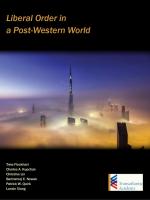The end of universalized values?
A group of scholars from the United States and Europe – including Trine Flockhart from DIIS - argue in the Transatlantic Academy’s report Liberal Order in a Post-Western World that Europe and the United States must accept that the international order built by the West and based on its values will not be universalized as their material and ideological hegemony wanes with the rise of China and other emerging powers.
The report argues that the West must instead respond to on-going changes by solidifying their societies, strengthening their economies, and reinvigorating their alliances in order for the West to act as an anchor for liberal values, whilst at the same time finding common ground with emerging powers to forge a new rules-based global order.
The authors agree that peacefully managing the onset of a polycentric world will require compromise, tolerance, and recognition of political diversity and that the coming era of geopolitical flux and uncertainty will necessitate a strong and resolute West to guide the ongoing change. Necessary steps for strengthening the liberal anchor include reinvigorating the transatlantic partnership through:
- a TTIP agreement between the United States and European Union, open for other countries to join provided they meet its standards;
- a capable NATO that accepts a geographical division of labor while maintaining full commitment to collective defense;
- the construction of a coalition for Internet governance to ensure an Internet where access and content are open to all
- greater U.S.-EU cooperation on development aid.
The report also recommends strategically engaging emerging powers in a number of areas, including:
- working with China to provide security in the Mediterranean, a region where Beijing is increasing its economic and military footprint;
- reopening the conversation on prevention of mass atrocities by using Brazil’s “Responsibility while Protecting” (RwP) proposal as a starting point o develop greater consensus; and
- cooperating with these powers on development aid
The report also suggests that the West must reduce its dominance of global economic institutions such as the International Monetary Fund and World Bank to encourage emerging powers to provide more global public goods and prevent the marginalization of such institutions.
Individual chapters of the report examine how the international liberal order is viewed by countries such as China, India, Brazil, South Africa, and Nigeria; global economic governance; TTIP; the changing world of development aid; Internet governance; China’s emerging role in the Mediterranean; and the use of partnerships to sustain order.
Liberal Order in a Post-Western World was authored by the six Academy fellows:
Trine Flockhart
of the Danish Institute for International Studies
Charles A. Kupchan
of the Council of Foreign Relations and Georgetown
University
Christina Lin
of the Center for Transatlantic Relations at Johns
Hopkins University Bartlomiej E. Nowak of the
Vistula University in Warsaw
Patrick W. Quirk
of Johns Hopkins University
Lanxin Xiang
of the Graduate Institute in Geneva.
Shorter-term fellows and other scholars contributed additional chapters and boxes on topics such as monetary order, the eurozone crisis, and the Middle East.

